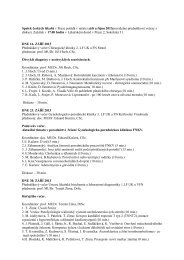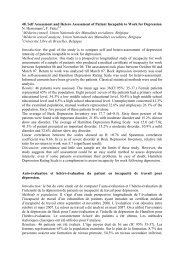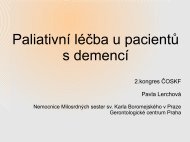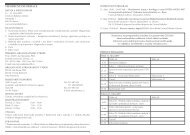ABSTRACTS â ORAL PRESENTATIONS - AMCA, spol. s r.o.
ABSTRACTS â ORAL PRESENTATIONS - AMCA, spol. s r.o.
ABSTRACTS â ORAL PRESENTATIONS - AMCA, spol. s r.o.
Create successful ePaper yourself
Turn your PDF publications into a flip-book with our unique Google optimized e-Paper software.
Effects of studied newly synthesized PDMP derivatives were dependent on their chemical<br />
structure and duration of cell cultivation. Several derivatives were able to change<br />
Ca 2+ transport already after 15 minutes of cultivation, but their effect of cell viability<br />
manifested only after 12 h of cultivation. Activity of GlcCer synthase was affected in case<br />
of 4 from 12 studied compounds after longer cultivation, but was not in relation with<br />
changes in calcium transport and cell viability.<br />
Acknowledgement<br />
This work was supported by grant agency VEGA No. 01/0471/11 and 01/0441/11<br />
References:<br />
1. Hakomori, S. and Igarashi, Y. (1993) Adv. Lipid Res. 23, 147–162<br />
2. Lahiri, S. and Futerman, A. H. (2007) Cell. Mol. Life Sci. 64 (2007) 2270 – 2284<br />
P27. DOCOSAHEXAENOIC ACID EFFECTIVELY STIMULATES TRAIL-INDUCED APOPTOSIS<br />
OF COLON CANCER CELLS AT THE LEVEL OF MITOCHONDRIA<br />
Belma Skender 1, 2 , Björn Kruspig 3 , Vladimir Gogvadze 3 , Jiřina Hofmanová 1, 2 , Alois<br />
Kozubík 1, 2 , Boris Zhivotovsky 3 , Alena Hyršlová Vaculová 1<br />
1<br />
Department of Cytokinetics, Institute of Biophysics, Academy of Sciences of the Czech<br />
Republic, v.v.i., Královopolská 135, 612 65 Brno, Czech Republic;<br />
2<br />
Department of Animal Physiology and Immunology, Faculty of Science, Masaryk<br />
University, Terezy Novákové 64, 621 00 Brno, Czech Republic<br />
3<br />
Institute of Environmental Medicine, Division of Toxicology, Karolinska Institutet, Box<br />
210, Stockholm, SE-171 77 Sweden<br />
belma@ibp.cz, vaculova@ibp.cz<br />
Docosahexaenoic acid (DHA), an essential n-3 polyunsaturated fatty acid, is known for<br />
its beneficial effect in a wide variety of diseases ranging from autoimmune disorders<br />
to several types of malignancies including colorectal cancer. During carcinogenesis,<br />
mitochondria-dependent apoptotic pathways are very frequently suppressed, which<br />
results in attenuation of cell death and enhanced proliferation. Mitochondria belong<br />
to the subcellular sites where n-3 fatty acids are rapidly incorporated. DHA containing<br />
six double bonds causes cardiolipin structural changes and increases mitochondrial<br />
membrane fatty acids unsaturation, their susceptibility to oxidative stress and alters<br />
membrane barrier properties. We hypothesize that DHA might facilitate the toxic effects<br />
of certain antitumour agents, which could directly and specifically reinforce apoptosis in<br />
cancer cells. Our aim was to elucidate a potential sensitizing effect of DHA on apoptosis<br />
induced by a cytokine of the tumor necrosis factor (TNF) family - TRAIL (TNF-related<br />
apoptosis inducing ligand) in colon cancer cells. TRAIL has been shown to selectively<br />
induce apoptosis in tumor, but not in normal cells. However, many tumor cells may still<br />
exhibit a TRAIL-resistant phenotype, which is currently a major obstacle in TRAIL-based<br />
therapy.<br />
Here, we demonstrate that DHA is capable to increase significantly apoptosis induced<br />
by this cytokine and highlight the importance of the mitochondrial apoptotic pathway in<br />
Analytical Cytometry VII 119








